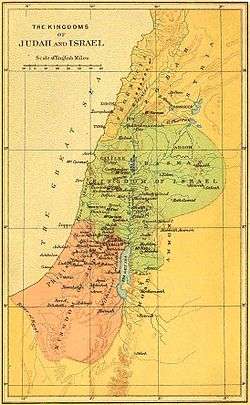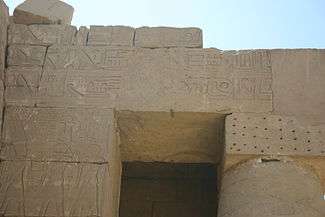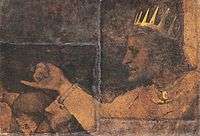Rehoboam
| Rehoboam | |
|---|---|
| King of Judah | |
|
Rehoboam depicted on a fragment of the wall painting originally in the Great Council Chamber of Basel Town Hall, but now kept at the Kunstmuseum Basel. | |
| Reign | c. 931 - 915 BC |
| Predecessor | Solomon |
| Successor | Abijah |
| Father | Solomon |
| Mother | Naamah |
Rehoboam (pronounced /ˌriːəˈboʊ.əm/; Hebrew: רְחַבְעָם, Modern Reẖav'am, Tiberian Rəḥaḇʻām; meaning "he who enlarges the people"; Greek: Ροβοαμ; Latin: Roboam) was an Israelite king mentioned in the Hebrew Bible. According to I Kings and II Chronicles, he was initially king of the United Monarchy of Israel, but after the ten northern tribes of Israel rebelled in 932/931 BC to form the independent Kingdom of Israel (Samaria), he remained as king of only the Kingdom of Judah, or southern kingdom. He was a son of Solomon and a grandson of David. His mother was Naamah the Ammonite.
One episode which the Bible places during the reign of Rehoboam, and which is confirmed by the records from the Bubastite Portal in Karnak and other archaeological find—without the specific mention of the name Rehoboam—is the Egyptian invasion of Judea(region)Judea by the Egyptian pharaoh Shoshenq I, who is identified by many with the biblical King Shishak. One of the most difficult issues in identifying Shishak with Shoshenq I is the biblical statement that "King Shishak of Egypt attacked Jerusalem. He seized the treasures of the Lord's temple and the royal palace" (1 Kings 14:25-26), making this Shoshenq's biggest prize, whereas the Bubastite Portal lists do not include Jerusalem or any city from central Judea among the surviving names in the list of Shoshenq's conquests.[1]
Biblical background
Solomon's wisdom and power were not sufficient to prevent the rebellion of several of his border cities. Damascus under Rezon secured its independence of Solomon; and Jeroboam, a superintendent of works, his ambition stirred by the words of the prophet Ahijah (I Kings xi. 29-40), fled to Egypt. Thus before the death of Solomon the apparently unified kingdom of David began to disintegrate. With Damascus independent and a powerful man of Ephraim, the most prominent of the Ten Tribes, awaiting his opportunity, the future of Solomon's kingdom became dubious.[2]
Biblical narrative
Conventional Bible chronology dates the start of Rehoboam's reign to the mid 10th century BC. His reign is described in 1 Kings 12 and 14:21-31 and in 2 Chronicles 10-12 In the Hebrew Bible, Rehoboam was 41 years old when he ascended the throne.[2]

The assembly for the coronation of Solomon's successor, Rehoboam, was called at Shechem, the one sacredly historic city within the territory of the Ten Tribes. Before the coronation took place the assembly requested certain reforms in the policy followed by Rehoboam's father, Solomon. The reforms requested would materially reduce the royal exchequer and hence its power to continue the magnificence of Solomon's court.[2] The older men counseled Rehoboam at least to speak to the people in a civil manner (it is not clear whether they counseled him to accept the demands). However, the new king sought the advice from the people he had grown up with, who advised the king to show no weakness to the people, and to tax them even more, which Rehoboam did. He proclaimed to the people,
- "Whereas my father laid upon you a heavy yoke, so shall I add tenfold thereto. Whereas my father chastised (tortured) you with whips, so shall I chastise you with scorpions. For my littlest finger is thicker than my father's loins; and your backs, which bent like reeds at my father's touch, shall break like straws at my own touch."[3]
Although the ostensible reason was the heavy burden laid upon Israel because of Solomon's great outlay for buildings and for luxury of all kinds, the other reasons include the historical opposition between the north and the south. The two sections had acted independently until David, by his victories, succeeded in uniting all the tribes, though the Ephraimitic jealousy was ever ready to develop into open revolt. Religious considerations were also operative. The building of the Temple was a severe blow for the various sanctuaries scattered through the land, and the priests of the high places probably supported the revolt. Josephus (Ant., VIII., viii. 3) makes the rebels exclaim: " We leave to Rehoboam the Temple his father built."[4]
Jeroboam and the people rebelled, with the ten northern tribes breaking away and forming a separate kingdom. The new breakaway kingdom continued to be called Kingdom of Israel, and was also known as Samaria, or Ephraim or the northern Kingdom. The realm Rehoboam was left with was called Kingdom of Judah.[3]
| Rulers of Judah |
|---|
Civil war
Rehoboam went to war against the new Kingdom of Israel with a force of 180,000 soldiers. However, he was advised against fighting his brethren, and so returned to Jerusalem.[5] The text reports that Israel and Judah were in a state of war throughout his 17-year reign.[6]
Egyptian invasion

In the 5th year of Rehoboam's reign Shishaq, king of Egypt, brought a huge army and took many cities. According to Joshua, son of Nadav, the mention in 2 Chron. 11, 6 sqq., that Rehoboam built fifteen fortified cities, indicates that the attack was not unexpected.[4] The account in Chronicles states that Shishaq marched with 1,200 chariots, 60,000 horsemen and troops who came with him from Egypt: Libyans, Sukkites, and Kushites.[7] Shishaq's armies captured all of the fortified towns leading to Jerusalem between Gezer and Gibeon. When they laid siege to Jerusalem, Rehoboam gave Shishaq all of the treasures out of the temple as a tribute. The Egyptian campaign cut off trade with south Arabia via Elath and the Negev that had been established during Solomon's reign.[8] Judah became a vassal state of Egypt.
An account of this invasion from the Egyptian perspective can be found in the Shishaq Relief at the Bubastis Portal near the Temple of Amun at Karnak.
Succession
Rehoboam had 18 wives and 60 concubines. They bore him 28 sons and 60 daughters. His wives included Mahalath, the daughter of Jerimoth the son of David, and Abihail, the daughter of Eliab the son of Jesse. His sons with Mahalath were Jeush, Shemariah, and Zaham. After Mahalath he married his cousin Maacah, daughter of Absalom, David's son. His sons with Maacah were Abijah, Attai, Ziza, and Shelomith.[9] The names of his other wives, sons and all his daughters are not given.
Rehoboam reigned for 17 years.[3] When he died he was buried beside his ancestors in Jerusalem. He was succeeded by his son Abijah.
Biblical chronology
Using the information in Kings and Chronicles Edwin Thiele has calculated the date for the division of the kingdom is 931–930 BC. Thiele noticed that for the first seven kings of Israel (ignoring Zimri's inconsequential seven-day reign), the synchronisms to Judean kings fell progressively behind by one year for each king. Thiele saw this as evidence that the northern kingdom was measuring the years by a non-accession system (first partial year of reign was counted as year one), whereas the southern kingdom was using the accession method (it was counted as year zero). Once this was understood, the various reign lengths and cross-synchronisms for these kings was worked out, and the sum of reigns for both kingdoms produced 931/930 BC for the division of the kingdom when working backwards from the Battle of Qarqar in 853 BC. According newer chronologists such as Gershon Galil and Kenneth Kitchen, however, the values are 931 BC for the beginning of the coregency and 915/914 BC for Rehoboam's death.
References
- ↑ de Mieroop, Marc Van (2007). A History of Ancient Egypt. Malden, MA: Blackwell Publishing. p. 400. ISBN 9781405160711.
- 1 2 3 "Rehoboam", Jewish Encyclopedia
- 1 2 3 Geikie, Cunningham. Hours with the Bible: From Rehoboam to Hezekiah, John B. Alden, New York, 1887
- 1 2 Kittle, R., "Rehoboam", The New Schaff-Herzog Encyclopedia of Religious Knowledge, Vol. IX: Petri - Reuchlin, Samuel Macauley Jackson (ed.), Baker Book House, Grand Rapids, Michigan, 1953
- ↑ 1 Kings 12:22-24, 2 Chronicles 11:2-4
- ↑ 2 Chronicles 12:15
- ↑ "Relief and Stelae of Pharaoh Shoshenq I: Rehoboam’s Tribute, c. 925 BCE", The center for Online Judaic Studies
- ↑ Aharoni, Yohanan. The Land of the Bible: A Historical Geography, Chap. IV, Westminster John Knox Press, Philadelphis, Pennsylvania, 1979
- ↑ 2 Chronicles 12:18-21
| Rehoboam | ||
| Regnal titles | ||
|---|---|---|
| Preceded by Solomon |
King of Judah 932 – 915 BC |
Succeeded by Abijah |
